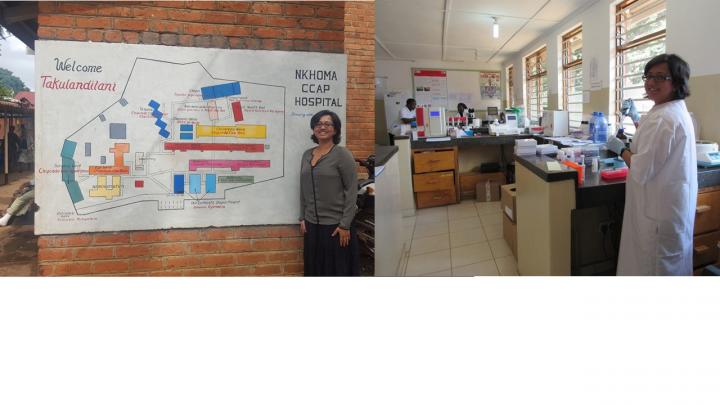International development fund to study Human Papillomavirus genotypes in rural Malawi
Dr Ramya Bhatia was funded by Microbiology Society International development fund to carry out a four week research project in Nkhoma Church for Central Africa Presbytarian (CCAP) hospital laboratory.
Human Papillomavirus (HPV) causes cervical cancer. There are over 200 types of HPVs, however, only 14 high-risk (HR) HPV types are associated with ano-genital cancers particularly cervical cancer. In the UK, cervical cancer is controlled through excellent vaccination and screening programmes.
Malawi has the highest incidence of cervical cancer in the world. The University of Edinburgh is involved in several projects through the Scottish Malawi partnership (http://www.ed.ac.uk/global-development/news-events/archive/2012/scotland-malawi). Through Scottish Government funding, University of Edinburgh has facilitated the establishment of Cervical cancer screening programme in Nkhoma hospital (http://www.ed.ac.uk/global-health/research/project-profiles/non-communicable-diseases/cervical-cancer-screening). As part of the screening programme in the last 4 years, over 17,000 women have been screened for cervical pre-cancer and more than 80% of those with pre-cancerous lesions have been treated on the same day preventing future cancers. The programme also looked into investigation of HPV types prevalent in the female population as there is no data associated with the types of circulating HPV or the types of HPV causing pre-cancerous lesion and cancers in Malawi.
Ramya spent 4 weeks in the rural hospital laboratory where she set up a molecular suite to perform DNA extractions and carried on Human Papillomavirus (HPV) genotyping using a real time polymerase chain reaction (RT-PCR) assay (Papilloplex All HPV assay, Genefirst, Oxford, UK). This involved shipping all laboratory equipment from Edinburgh to carry out the tests. During her time, she tested cervical smear samples from over 300 women attending the cervical cancer screening clinic and identified the prevalence of 31 HPV types (both high-risk and low risk). She also carried out training for the laboratory staff in molecular techniques. She also got the opportunity to visit several rural hospitals and learn about the excellent work being carried out.
Ramya’s experience of working in a rural hospital laboratory has been an eye-opener to the challenges faced in low income countries. However, the learning opportunities of working in a rural setting in Africa was immense and she would encourage other members of staff and students to take on any such opportunities.


